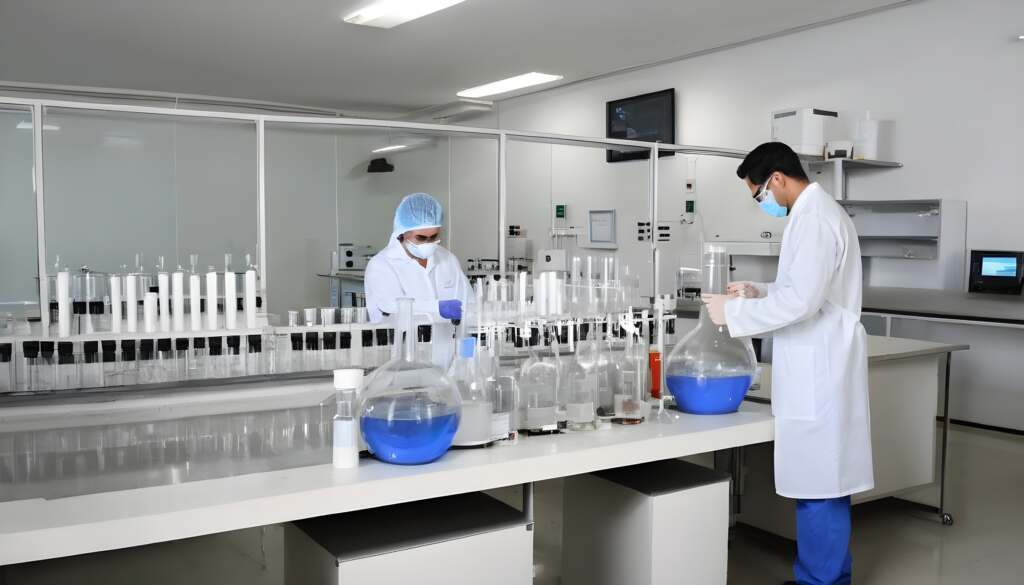Milk is a staple in Indian households, and its quality directly impacts our health. From children to elderly family members, everyone relies on milk for essential nutrients like calcium, protein, and vitamins. However, adulteration and contamination in milk are significant concerns. That’s why regular milk testing is vital to ensure its safety, nutritional value, and adherence to health standards.
In this detailed guide, we explore the services provided by a Milk Testing Laboratory in Jabalpur, the importance of IS standards in milk testing, and everything you need to know to make informed decisions about milk quality.
What is Milk Testing?
Milk testing involves analyzing the quality, composition, and safety of milk using various scientific methods. It identifies adulterants, measures nutritional content, and ensures compliance with food safety regulations.
Milk testing benefits:
- Detecting adulterants like water, urea, or starch.
- Measuring fat and solids-not-fat (SNF) content.
- Preventing health issues caused by contaminated milk.
- Ensuring milk meets legal and industry standards.
Milk Testing Services Offered in Jabalpur
At our Milk Testing Laboratory in Jabalpur, we provide a range of services to cater to diverse needs:
1. Adulteration Testing
Detect common milk adulterants such as:
- Water
- Detergent
- Starch
- Synthetic milk
These tests ensure that milk is free from harmful chemicals and substances.
2. Fat Content Analysis
This test determines the fat percentage in milk, essential for pricing and grading.
3. Solids-Not-Fat (SNF) Testing
SNF represents the non-fat solids in milk, including proteins, lactose, and minerals. Accurate SNF levels ensure milk’s nutritional value.
4. Microbial Testing
Identifies harmful bacteria like E. coli, Salmonella, or Listeria in milk to ensure it is safe for consumption.
5. Nutritional Testing
Analyzing levels of essential nutrients, such as:
- Proteins
- Vitamins
- Calcium
6. Milk Product Testing
We also test products like curd, butter, cheese, and ghee to ensure quality and safety.
IS Standards Followed in Milk Testing
Our Milk Testing Laboratory strictly adheres to Indian Standards (IS) to ensure accurate and reliable results. Below are the essential IS codes used in milk testing:
- IS 1479: General methods of milk testing in dairy laboratories.
- IS 13688: Sensory evaluation techniques for milk and milk products.
- IS 5162: Determination of water content in dairy products.
- IS 10083: Methods to detect added water in milk.
- IS 11779: Guidelines for microbiological analysis of milk.
- IS 1224: Determining fat percentage using Gerber or other methods.
These standards ensure uniformity in testing procedures and maintain accuracy across laboratories.
How Milk Testing Works?
Here is a step-by-step overview of the milk testing process:
- Sample Collection
Milk samples are collected in sterilized containers to avoid contamination. - Preliminary Checks
Basic physical tests, like checking for smell, color, and texture, are conducted. - Laboratory Testing
Advanced equipment is used to test parameters like fat content, SNF, and microbial safety. - Report Generation
A detailed report is provided, including all test results and any recommendations for improvement.
Why Choose RKCT Laboratory for Milk Testing in Jabalpur?
Accuracy
We use advanced testing equipment to deliver precise results.
Compliance with IS Standards
All testing procedures adhere to IS standards, ensuring reliability.
Affordable Services
Our testing services are cost-effective, making quality milk testing accessible to all.
Quick Results
Get your test results within a short turnaround time.
Conclusion
Milk is a crucial part of our daily diet, and its quality should never be compromised. At our Milk Testing Laboratory in Jabalpur, we ensure your milk meets all safety and quality parameters. By adhering to strict IS standards, we provide accurate results that you can trust.
Visit our laboratory today to ensure the milk you consume is safe, pure, and nutritious.
Need Help?
FAQs
Lorem ipsum dolor sit amet, consectetur adipiscing elit.
Mauris eros dolor pellentesque sed luctus dapibus lobortis orci.
1. What are IS standards, and why are they important for milk testing?
IS standards are guidelines set by the Bureau of Indian Standards (BIS) to ensure uniform testing procedures across laboratories. They help maintain accuracy and reliability in milk testing.
2. How can I detect adulteration in milk?
While some adulterants can be identified visually or by smell, laboratory testing is the most reliable way to detect harmful substances in milk.
3. What is SNF, and why is it important?
SNF stands for Solids-Not-Fat, which includes proteins, vitamins, and minerals. It determines the nutritional value of milk.
4. How often should milk be tested?
If you are a supplier or large-scale consumer, milk should be tested regularly. For households, occasional testing is recommended to ensure safety.
5. Can you test milk products like curd or ghee?
Yes, we offer comprehensive testing for various milk products, ensuring they meet quality and safety standards.




